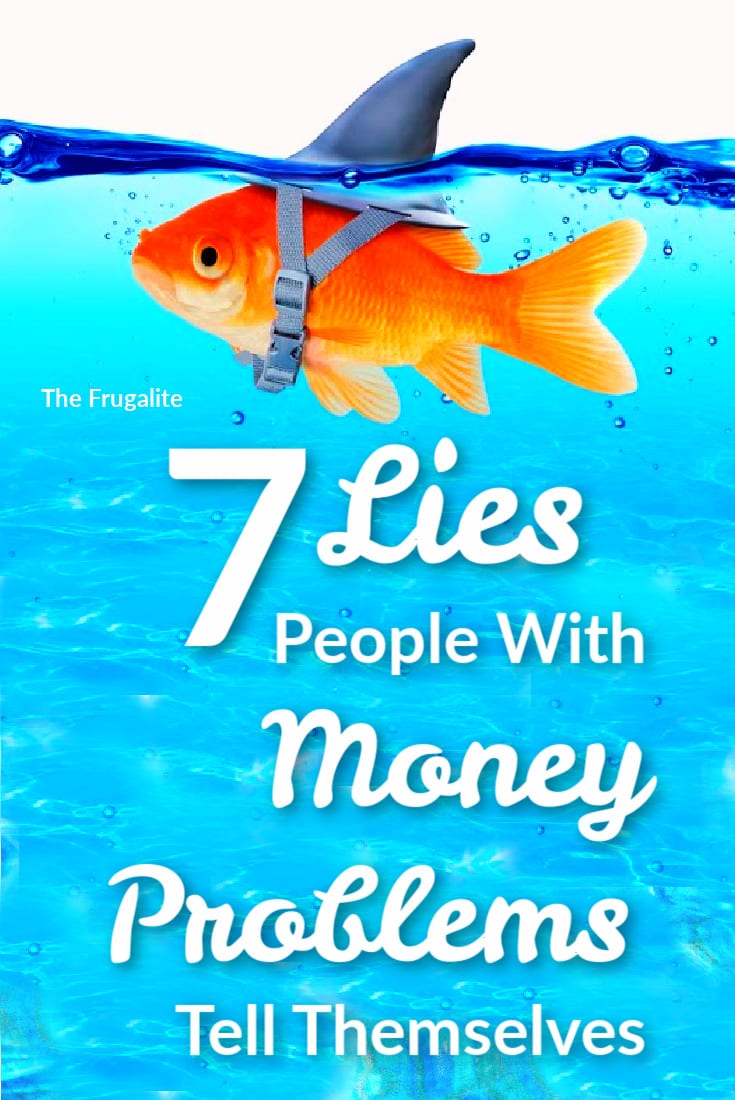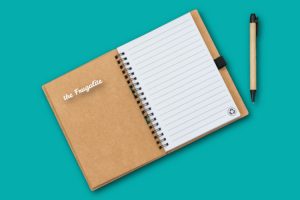(Psst: The FTC wants me to remind you that this website contains affiliate links. That means if you make a purchase from a link you click on, I might receive a small commission. This does not increase the price you’ll pay for that item nor does it decrease the awesomeness of the item. ~ Daisy)
Money problems can happen to anyone.
But have you noticed, for some people, it’s ongoing and just continues to spiral downward, while for others it’s a shorter-term problem? National economy aside, why is this the case?
I think a lot of it has to do with the things that people tell themselves that are simply not true. These lies are very common, and they can keep you trapped in a bad situation for a very long time.
It’s not my fault.
Actually, it probably is.
I know that sounds harsh, but bear with me. Taking personal responsibility for your mistakes is the first step toward setting things right. Nearly every financial situation could have been different if a different series of decisions had been made. Your honest analysis of this will help you to refrain from repeating them and will also aid you in untangling your mess.
So while there are things that are not within our control, like a catastrophic illness or injury, there were also plenty of things you could have controlled. You need to recognize these things. It’s essential to own your culpability.
This doesn’t mean you need to beat yourself up about it. Put away the sackcloth and ashes because we’re all human beings. I know I’ve made purchases I regret in the past. I’ve made an insurance claim that caused a horrific cascade of events and I wish I’d never made that claim. I started a business with a large loan that was an awful mistake. I’ve made mistakes and I recognize this. I forgive myself and I move forward with the knowledge that I’ve learned a valuable lesson.
It’s just this once.
Whether you’re buying something frivolous on your credit card, going out to dinner because you don’t feel like cooking, or take some other shortcut, it’s really never “just this once.”
Now, don’t get me wrong – I’m okay with all of these things given the right circumstances. These are the right circumstances:
- You can pay your credit card bill in full before it comes due and you have to pay interest.
- You’ve budgeted for dinner out that week
- Your expenditure falls within your allotted amount of spending money
If these things are true, then go ahead and do whatever it is you’re trying to justify with “just this once.” But remember, once you do that thing “just this once” it seems a whole lot easier to do it again…and again…and again. It’s very rarely “just this once.
My children shouldn’t know we are having money problems
I talked about this in detail in this article last week. But let’s discuss it a little bit more here.
Why is it that you don’t want your kids to know? Is it because you think they’ll be worried and stressed out? Or is it because you’ll feel like a failure or bad example?
If it’s because of how them knowing makes you feel, then you need to consider that living in a glowing perfect world where every bill payment is met with ease and budgets don’t seem to exist – things just magically work out – that’s a fairy tale. And if they grow up believing in that fairy tale, you are setting them up for a life of difficulty.
Your kids need to know to an age-appropriate degree what is going on, if for no other reason than for them to understand why you keep saying no to that Slurpee they want to get every time you’re at the gas station.
Paying off debt is always the most important thing.
Most of the standard advice for people with financial problems is that once you pay off all your debt, the world is your oyster. People tell themselves this is the case and work diligently toward paying off their credit cards, their mortgages, and their car payments to the detriment of other things. They tell themselves that paying off debt is the most important thing.
That’s not always true.
I’m not saying that debt repayment isn’t important – I strive to remain debt-free or debt-free aside from one payment at all times. However, if you are in a bad situation financially, there are lots of things you should be paying before you exceed the minimum payment on your debts.
Paying off your debt is not always the best use of your money, and it’s really difficult for most people to believe that. I always recommend this order: essential bills, food, savings, and then debt repayment. Having an emergency fund and a full pantry are insurance policies that will protect you during difficult times, and should, therefore, be a priority.
You have to have a credit card to get by in this world.
People believe that everyone must have a credit card to manage in the world. Admittedly, it does make life a bit easier. However, it’s far from a necessity, especially if you have a debit card with the Mastercard or Visa logo on it.
I went almost 50 years before getting my first general credit card. I had some store cards because of the discounts they offered by just didn’t feel that a general card was necessary. I have rented cars and hotel rooms, booked plane tickets and excursions, and managed to live my life perfectly well without using a credit card. I finally got one for business expenses when traveling and pay the whole thing off each month.
The thing to know about life without a credit card is that some places will put a hold on money in your bank account if you use your debit card in lieu of a credit card. This is especially true of car rentals and hotel bookings. So be sure you have an extra few hundred dollars in your account so that you aren’t on vacation without access to the money you planned to use for spending.
I deserve a treat.
This is one of the most dangerous financial lies out there. If you believe that budget be d*mned, you have had a bad day and you deserve that treat regardless, you’re treading into dangerous territory.
I believe in treats. That is the entire premise of this website: Live large on a tiny budget.
But these treats must be a part of your budget. If you just go and buy yourself an unscheduled treat every time you have a good day, every time you have a bad day, every time your kid does something special, every time the weather changes, every time there’s a holiday…well you get the idea. That’s a lot of treats, and depending on the level of your treat, that can really add up.
You don’t “deserve” a treat if it’s going to mean you can’t pay for an essential later. You don’t “deserve” a treat if it means you’re going to struggle to put gas in the car. If you are constantly worried about these kinds of basic expenses, you need to look at how you’re doling out the treats.
Also, take a hint from the dieting world. People in the weight loss business suggest that you make your treats non-food. Maybe make your treats non-monetary. Go for a walk, get a book you’ve been wanting to read from the library, or watch a movie online that nobody in your family wants to see, popcorn included.
Money doesn’t buy happiness.
I disagree with this to a large extent. I can tell you for a fact that I am a much happier person now that I have enough money than I was when I had to dig through a dumpster to find food that was suitable to feed my daughter. I’m far happier now than I was when I had to choose between buying groceries or paying the electric bill. I’m positively ecstatic in comparison to when I lost my home to foreclosure and my car to repossession.
So while having money doesn’t guarantee your life will be filled with angels singing “Hallelujah” and that nothing terrible will ever happen to you again, it does make things so much less stressful. And less stress, for me, is a huge component of my happiness levels.
Sure, there are rich folks who are miserable. We see reports of celebrities taking drug overdoses and committing suicide all the time. We hear about wealthy people getting divorced and becoming embroiled in heated custody battles. Expensive cars are involved in horrific accidents that cause injuries or death just like clunkers are. People in well-to-do families die just like they do in poverty-stricken families.
But I guaran-dang-tee you that being concerned about your electricity flickering off during the visitation of that lost loved one would make your situation a whole lot worse.
Money makes your life easier, more comfortable, and less stressful. And while that isn’t a recipe for joy, it sure does help make room in your life for seeking those things that make you truly happy.
What are some other financial lies people tell themselves?
Do you have anything I should add to this list? Do you agree that these are lies or do you think I’m wrong? Let’s talk about it in the comments section.












31 thoughts on “7 Lies People With Money Problems Tell Themselves”
SUCH a great article..
Good article!
Frugal tip for keeping your house warm in winter-
Use bubblewrap on the inside of your windows for additional insulation.
First cut to size, then mist the window with water from a spray bottle. This will help the bubblewrap adhere to the glass. No tape needed.
Telling yourself that your home insurance company will take care of you in case of a house fire, rioter attack, or whatever — without checking their reputation. There are some insurance companies that make a practice of stiffing some percentage of legitimate claimants all the way through the various stages of the protest process. Those include filing a protest with the state insurance commission, filing a lawsuit, filing an appeal, etc. My buddy had a legitimate $25,000 hail damage claim on his roof. He had a 3-year fight with Farmers Insurance who pulled out every excuse in the book until he simply gave up. Do your homework up front instead.
Telling yourself that if your house gets foreclosed, there’s nothing you can do about it. In fact, it depends. In some states if it’s a property tax or code enforcement fine issue, some cities will try to keep all your equity after they auction off your house on the cheap. In some states they can get away with that. In others you have the right to recover whatever equity is left over after the basic bill is paid — but the government will never tell you that. Here’s an example:
https://fee.org/articles/home-equity-theft-how-a-man-s-home-was-seized-over-841-in-unpaid-taxes/
If it’s a code enforcement issue, the city will never tell you that the US Supreme Court case of Timbs v. Indiana in a Feb 2019 9-0 decision ruled that the constitutional prohibition on excessive fines and punishments now applies not only to the federal government but also down through the state, county, and even city levels. But it might take a court fight to get that principle enforced so that the city gets a well deserved spanking. See these examples:
https://ij.org/press-release/florida-man-could-lose-his-home-for-having-long-grass/
and also here:
https://ij.org/case/timbs-v-indiana
If you get a surprisingly humongous medical bill, and believe there’s nothing you can do (or could have done) about it, think again. The vast majority of such US bills today are badly inflated … with such faults as double billing, billing for procedures not done, etc, etc. There are organizations that can either 1) negotiate your bill downwards to help to some extent, or 2) teach you how to do that negotiation yourself.
And even that may not be sufficient. You may need to do some shopping around in advance, and even consider exercising your right to “medical tourism.” That is traveling to some other country where the medical cartel in the US has no ironclad control. You may even be able to get time-tested treatments in other countries that the cartel’s captive enforcement agency, the FDA, has zero jurisdiction. You would need a current US passport.
Finally, you may believe that simply accumulating cash savings (whether in a bank, credit union, or under your mattress) is the best you can do for emergencies. In fact, the Federal Reserve’s system of counterfeiting the money supply to fund the permanent warfare-welfare state is a racket that has stolen nearly all the purchasing power of the US dollar since 1913. To understand the severity of this institutionalized crime, realize that the US 1794 Coinage Act specified the death penalty for such behavior in Section 17. (That’s not mentioned in any government school history book. Gosh, I wonder why…)
So what can you do in the face of such legalized plunder to preserve the purchasing power of your earnings? Here’s a list — you’ll have to make decisions as to how to allocate your cash and efforts among them:
Save as much as you can, given your own unique skills, knowledge and time limits.
Squirrel away enough funds for mandatory routine expenses to survive.
Squirrel away enough funds for surprise gotcha emergencies.
Explore whatever possibilities make sense (given your unique skills, knowledge and resources) for earning more money — especially in ways that can operate online or in ways that don’t conflict with the Covid-19 rules that may last way longer than any of us right now can imagine. Also consider businesses where you have the ability to raise prices in case inflation goes through the roof. (Daisy’s digital and print information business is one sterling example.)
Finally, convert some of the earnings above into precious metals — preferably some inside the US and some outside — in case you ever need to jump ship as many of your ancestors did in centuries gone by. Just remember that the TSA and many police departments have adopted the utter lack of ethics from the Sheriff of Nottingham plundering out of the old Robin Hood stories. Cash is one of their favorite targets of plunder. Monitor the TSA cash reporting rules so you don’t get snake-bit.
–Lewis
Here’s another one: “I’ll make it up later.” meaning that I will get a better job in the future, I will save more money later, etc. It’s essentially kicking the can down the road.
And another: “I can always go to one of those credit forgiveness companies that advertise on Fox News” They’ll get my credit card debt erased.
And another: “Who cares how much debt I have. When I die I won’t have to pay it.” “As long as I can make the minimum payments and they keep expanding my credit, why worry?”
We often end up in debt due to medical costs. The one important thing I have learned along the way is that when the debt collectors call, if you say “I plan to pay off all our debt” then they are willing to listen. They may not agree with the amount you can pay but if you keep saying “in order to pay off all my debt, this is how much I can send you a month.” Eventually they will work with you.
With medical bills often you can work with the hospital and they can help with spreading out the payments or even forgiving some of the amount. The paperwork they require is invasive but if you truely cannot pay, they will help, we have had as much as $30,000 taken off based on that paperwork.
beware of medical bills that you agree to make payments (most only agree if above certain percentage each month) because what they do not tell you is that after a certain amount of time (usually one year) that the account is handed over to collections without telling you until you get calls/paperwork telling you. then there is no more payments & the harrassment begins until you are sued/pay off debt.
Daisy Perfect timing, and m guilty of I’ll make it up later. I always do but the stress it creates can be overwhelming. I’ve been thinking alot about prepping vs saving . It’s a struggle, I’ve spent more on preps since November than I have altogether in previous years combined. My budget is back on track but without spending the extra money early on I would’ve struggled in Australia with the panic buying in the supermarkets leaving shelves bare and I brought six months extra clothing for my kids which also was the right choice as there was a shortage on kids clothes as most comes from China for new and our local op shops were cleaned out too. I suppose what I’m asking is how do you balance both ? Probably a new article worth right here with that question. But I struggle with it personally and I know my friend does too.
I struggle with this also, even at considered middle class but living with debt & continuing to save which for us meant living frugally (which is what I’ve always done. Thank god I am a prepper because otherwise we would have been in bad position during pandemic & unexpected changes. In Michigan we are still struggling with product availability & with inflation causing price increases.
I actually just said that I need to unlearn how to be prepper because recent drastic unexpected changes left me with items no longer will use & can not return. while I have no problem donating but would like to be able to make some money back on these items.
Helpful money saving insights from Daisy. Daisy is all good on financial advice except on the credit card. I am so happy to be credit card free I use my ATM Debit card for all my transactions at least that keeps you living within your means and tons of online merchants accept an ATM/Debit card. If you can, phase out the car go with ride-share service or public transportation even a bicycle I am going on year two of no car ownership. Yeah Daisy I like capitalism makes my life easier and happier brings me more comfort to my child-free lifestyle. Yeah I don’t own a pet so keep yourself free of any major commitments that will compromise your ability to generate an income go with minimal luxury-health foods and activities.
Hi, Phil – these are “lies” that people tell themselves. I don’t think a credit card is necessary either. 🙂 You have some great advice, too!
Choosing to not have children or pets…what a sad life.
I don’t agree with that sentiment “what a sad life”. If you don’t want children, don’t have them, pure and simple. Not every man and/or woman is meant to have children. Any person or printed document that states s/he is, is just OPINION, not fact. Far too many children (and animals) are not treated with the respect, guidance, necessities, kindness and care they deserve.
OP should be applauded for his honesty.
Since I left that comment almost a year ago, and apparently the one I was referring to has been deleted, there’s not much context. OP? Opinions? Initials?
Let’s do each other a big favor, Selena, and stop making comments on each other’s posts. I have to reach for the Tums nearly every time I read what you comment, and you probably feel the same. Judging from many of the comments you’ve made, I’ll bet that you and I agree on almost nothing. In all likelihood, we’re never going to change one single opinion of the other one. So for the sake of peace on The Frugalite and The Organic Prepper, can we please just ignore each other?
How about “I’ll always have a car payment”. It was so liberating when I made the the decision to trade in the vehicle I was forced to buy on credit after Hurricane Dorian totalled mine (along with 2 ft water in my house). Yes, I had to pay some cash to do it, but over time the savings will be 4 times what I paid in cash. Also, the bank can’t reposses this one.
The corollary lie is “old cars aren’t as reliable”. On the contrary, I had 3 recalls on the newer one in 12 mons & older vehicles have been through all those already. I routinely run my Tahoe & Subaru over 300K.That’s alot of money saved.
Regarding payments: (paraphrasing), ‘the average person over a lifetime will have paid approx $130,000+ in INTEREST FEES ALONE.’ My dad always paid cash for cars. When he got his new or slightly new vehicle, he continued saving for the next one… My point here is NOT a vehicle or auto loan debate. I was taught by example to mimic his self discipline, contentedness, and willingness to wait! *Needs vs wants* were addressed in our household. I am very thankful for his examples to me. 🙂
Years ago, I had a creditor call, and I told them all I could afford to pay was $5 a month. I did not tell them I would not pay. They never contacted me again.
Save all of your change and separate all coins.when buying anything example when an item costs $5.25 save the $.75 cents change it adds up quickly.In a years time you will have enough for plenty of can goods.And paying with cash could get you a Quite A discount.
Hi Daisy! I’m thinking this is a new project of yours – looks great! I just paid off my car – feels good – but need to do some re-evaluating of my priorities. I’m very grateful to be working during these times, so i have not a thing to complain about. Just keep my head down & stay focused.
thanks again for another encouraging blog!
Thank you for the kind words! I’m so glad you like the new site 🙂
Keep in mind that funds charged fraudulently on ATM cards are not guaranteed by your bank. My son just had some use his ATM card to the tune of $600 in 3 days.
Right. One of our sons had his pin stolen at a gas station. It was a real mess getting it resolved. The irony was that it was in Huntsville (where the state prison in Texas is), and he was there to visit a friend in the penitentiary.
#1 lie –
“I need this…”
about things you don’t need at all.
I heard this a lot when working the drive thru at a well known fast food joint. People would most of the time say “I need…”
also good for private if youhave close neighbors keeps the inside cool in the summer
Knowing a want versus a need is a paramount. Numerous times I’ve looked through a catalog (yeah, I’m old school). I’ll dog-ear a page and leave it be for a while. Or add an item to my list and leave it be. Usually next time through the catalog or later review of list finds me not needing it.
Another lie/mistake is presuming one will get a raise and/or a bonus and/or inheritance. None are guaranteed and one should be relied upon. I could also add tax refunds to this list. Before someone gets on his/her high horse – yes, Uncle Sam sitting on your money isn’t ideal (but when deposit interest rates were a whopping .01%, who cares). BUT it is far better to *not* owe money when you file. Whatever refund we get goes to savings.
Besides the generic suggestions, this is not someone I would ever listen to for financial advice. They are speaking just from their own personal bias’ and beliefs. Paying off your debts should ALWAYS be the first thing you spend your money on each month. And you do not HAVE to have a credit card and many aren’t able to get one. And I doubt if this person really knows what not having enough money is really like. Hard pass on this advice.,
Hahahaha – I’ve written books about being without money and living in poverty. Actually, people who worry about paying off debt before buying groceries or keeping the electricity on are the ones who don’t truly understand what being without money is like.
Best wishes on your frugal journey!
You’re correct, Daisy. I’ve been there, and making sure my kids got to eat was was way more important than keeping the bank happy.
At 54, after growing up very poor and then spending most of my adult life living paycheck to paycheck because I felt I had to live at the maximum level of my means to flee that poverty, I can identify with all of Daisy’s points. When the money was good, life was grand; when times turned sour, the debt completely undermined my happiness due to the stress of figuring out how to keep paying for all those things I bought when times were good.
A few things I learned that I wished I’d known AND FOLLOWED when I was younger:
– Never buy a new car – it loses 20% of it’s price in value once you drive it off the lot, and that new car smell quickly fades away if you’re a daily driver. Instead, get an older model that meets your level of comfort and style. Even luxury cars can be found at affordable prices if you’re okay with driving something that’s 10 years old or more. Find something that you’re happy with, not something that impresses others. Buy it for you. I have two vehicles today – one is a 22-y.o. full size pickup, and the other is a 17-y.o. cruiser sedan. I love them both, and the upkeep is much less than monthly payments while they’re quality is near perfect. If you find you really need to assuage your new car urges, go rent something for a day or two instead.
– Only buy the amount of house you actually need. You can have luxury in a small space. Two people living in a 6,000 s.f. home means that the majority of your house is not being used. While real estate has almost always been a good investment, a house isn’t liquid. It takes time to get the equity out, and that money is better placed in investments, whether stocks, funds, or precious metals. So why have a house full of rooms that are rarely or never used?
– Don’t get a college degree unless it is a requirement for the career you really want to pursue. Too many people feel pressured to get a degree because having one – in anything – is the trendy thing to do these days. But degrees are expensive! And there is no guarantee that you’ll stay in the field that your degree is in; the majority do not. So if you need some doors open, get a 2-year Associates degree at the local community college if you must, and then see where that takes you. You’re going to learn most of your job on the job anyway, and as your experience grows employers won’t even care about your degree. Also, learning a trade is much cheaper, and many trades are paying over 6 figures today.
– Thrift stores are not for poor people; they are for thrifty people! Housewares, appliances, tools, books, and yes even clothes, can be found at bargain prices. So remember to go to the thrift store first before heading to the retail store for much of your purchases.
– DO, DO, DO make the effort to build up at least 3 months of living expenses in a savings account. The amount of comfort and ease of mind having that cash reserve brings is worth many times more than the actual value. Knowing that you’re prepared for most unplanned expenses yields confidence and frees your mind from worrying about the bills.
– Avoid the consumerism traps. We are bombarded daily with ads to go and buy the latest gadget or style. We see our friends get something new and we grow jealous. Why? Because we’re subtly told we’re failing if we don’t buy this or that. Marketers prey upon our egos, so don’t let them! Buying all the “latest and greatest” products only makes them wealthy, yet leaves you feeling like you deserve more. It is a con that has been going on in the West since TV really took off. Ignore them.
– Finally, true happiness comes from within, not from how much stuff you own. When we were kids, we’d find happiness playing with some sticks and using our imaginations. We didn’t care that the stick wasn’t a real sword; we believed it was! And that was good enough. This need to buy things was taught to us all over many years, shaping our relationship with money. Break that toxic relationship. Buy only the things you know will help bring you happiness for a long time, and without even knowing it you’ll reach a point where you really no longer have a desire to buy most things. And the money will truly start piling up.
When buying a car, for what do you look for? A car or transportation? For example, we recently bought a new car. This allowed us to get the features that we want. Sold the 11 year old luxury car for about 30% of the cost of the new car. The new car gets about 50% better gas mileage on cheaper gas. It also has all wheel drive for greater ease of mind in bad weather. We plan to keep it for a minimum of a decade. Paid cash for it. It doesn’t matter that it lost 20% of its value the moment that we drove it off the lot, that it is new means that we should have fewer repair bills and breakdowns over the decade+ that we plan to keep it. That peace of mind is worth something. We bought transportation, not a car.
So many purchases depend on for what the purchased item is to be used. Will it do the task for which it is acquired? Will you depend on it for your business and income? Will you need it for your business and income? As much as I don’t really want to, it looks as if I may need to purchase a welder to complete some work. Once I have it, there are some other projects that I could do. Just as in the example of the car above, I have to evaluate the tasks to make sure that the welder can do the work that is needed. My conclusion: I’ll buy for the project, not a welder.
As for personal consumables, I see no reason to spend more than necessary. I don’t recommend getting a college degree. What does a person need in housing beyond a bed, kitchen and rest room? If at all possible, have no debt. I’m not hard on clothing, my clothes usually last for years. Basically, I agree with Marbran, just don’t buy except what is necessary.
This is a fun article that comes from a good place and makes some good points. But it is also a self fulfilling prophesy about your money problems and why you had them. Because you, like most, clearly don’t understand money and don’t have a clue about wealth. Even if you have a very good job, like a top 10% job, accumulating a million dollars is a lifetime effort. You gotta live. So accumulating the million is gonna take a decade or two. Yet look around, there are millionaires everywhere. Some in their 20s. And not just tech kids, but investors, house flippers, etc. And the reason is because they know how to use credit. Because it’s the greatest thing in the world when used properly. It is a catapult to wealth if you understand it’s true and full power. But you’re not going to earn the same salary as the starting quarterback if you won’t even read the playbook. Economics is complex. It can be confusing. But guess what, you are a grown adult. People dumber than you have mastered it, and even unlocking a few basic secrets can change your fortunes. Also, build your credit as high as possible. If you’re not in the 800+ club I won’t kiss and tell. But you’ll find things available exclusively to you that are basically unlimited free, zero interest money if used correctly (to be clear it’s not free, but when done right you won’t know the difference). Don’t waste your time with ‘programs’ or ‘systems’ and definitely don’t pay anyone a penny besides your accountant (HAVE AN ACCOUNTANT!). Just read and learn. Some systems work. It’s ok to read about them. But most rely on basic tricks you can learn and apply yourself. Stack these skills. Learn to use credit cards and loans strategically. Take advantage of cash back and balance transfer loans. Use them to NEVER pay interest. I use 6 figures of credit every year, much of it ends up in my savings account, and I never pay interest. It’s just not that hard. It is a big boy game, so it will take some effort. But you’re a big boy and can definitely do it. Last thing, fully understand the difference between money and wealth and acquire as much wealth as you can. Not just money.